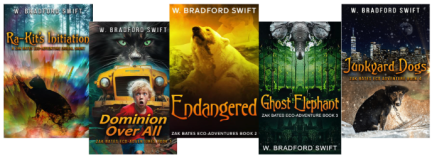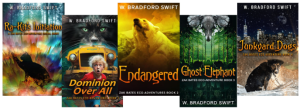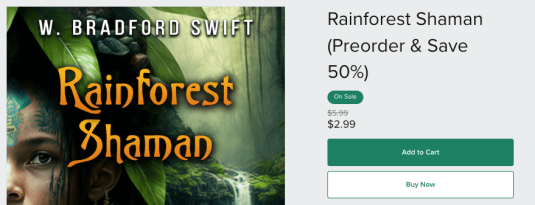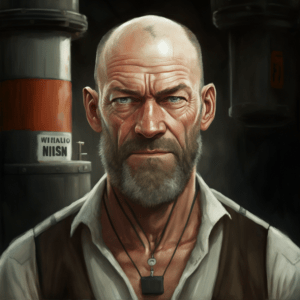Orrin Jason Bradford's Blog
June 23, 2023
Eco-Fantasy: The Genre That Can Inspire Your Child to Save the Planet
In recent years, there has been a growing interest in eco-fantasy and eco-fiction among readers of all ages. These genres combine the elements of fantasy and science fiction with a focus on environmental issues, sustainability, and the impact of human actions on the planet. In this blog post, we will explore what eco-fantasy and eco-fiction are and why you should encourage your children to read them.
What is Eco-Fantasy?
Eco-fantasy is a sub-genre of fantasy that deals with environmental themes, ecological systems, and the impact of human activities on the natural world. It features characters who are in tune with nature and who have a deep understanding of the interconnectedness of all things. Eco-fantasy stories often explore the balance between the natural world and human society, and how the two can coexist in harmony.
Examples of popular eco-fantasy books include The Lord of the Rings by J.R.R. Tolkien, The Earthsea Cycle by Ursula K. Le Guin, and The Mists of Avalon by Marion Zimmer Bradley.
What is Eco-Fiction?
Eco-fiction, also known as climate fiction or cli-fi, is a genre of fiction that focuses on the impact of climate change on the planet and humanity. It often takes a realistic and speculative approach to explore the consequences of environmental degradation and human actions on the planet.
Eco-fiction stories typically feature characters who are affected by climate change and who must adapt to survive. They also address the ethical and moral dilemmas surrounding environmental issues and the need for sustainable solutions.
Examples of popular eco-fiction books include The Water Will Come by Jeff Goodell, The Overstory by Richard Powers, and The Children of Men by P.D. James.
Why Should You Encourage Your Children to Read Eco-Fantasy and Eco-Fiction?
There are several reasons why you should encourage your children to read eco-fantasy and eco-fiction. Here are a few of them:
Environmental Awareness
Eco-fantasy and eco-fiction books can raise awareness about environmental issues and encourage children to think critically about the impact of human actions on the planet. These books can help children to develop a sense of empathy towards the natural world and to understand the importance of protecting it.
Imagination and Creativity
Eco-fantasy and eco-fiction books often feature imaginative and fantastical settings that can spark children’s creativity and imagination. These books can transport children to new worlds and introduce them to unique and diverse characters.
Empowerment
Eco-fantasy and eco-fiction books often feature characters who take action to protect the environment and who work to create a more sustainable future. Reading these books can inspire children to take action in their own lives and to become agents of change in their communities.
Education
Eco-fantasy and eco-fiction books can teach children about science, ecology, and the environment in an engaging and entertaining way. These books can help children to understand complex scientific concepts and to appreciate the diversity of life on Earth.
Eco-fantasy and eco-fiction are important genres that can inspire and educate children about the environment and the need for sustainable solutions. By encouraging your children to read these books, you can help to raise their awareness about environmental issues, spark their imagination, empower them to take action and provide them with a valuable education. So go ahead and pick up an eco-fantasy or eco-fiction book for your child today!
Here are a few good ones you can start with including my most recent eco-fantasy novel for young adult readers:
Rainforest Shaman by W. Bradford Swift – Embark on an enthralling journey through the lush Amazonian jungle in Rainforest Shaman, where ancient wisdom and enchanting spirits clash with corporate greed, in a race to protect nature’s heart from ruin.
Hoot by Carl Hiaasen – This book follows a group of kids who team up to save endangered owls and their habitat from a developer’s bulldozers. The
The Lorax by Dr. Seuss – This classic children’s book tells the story of a creature called the Lorax who speaks for the trees and tries to protect them from destruction by the Once-ler.
The One and Only Ivan by Katherine Applegate – This book is based on a true story and follows the life of Ivan, a captive gorilla who dreams of living in the wild and finding a home for himself and his friends.
The Wild Robot by Peter Brown – This book tells the story of a robot who washes up on an island and must learn to live in harmony with the island’s wildlife and ecosystem.
Pax by Sara Pennypacker – This book is about a boy and his pet fox who are separated by war and their journey to find each other.
Island of the Blue Dolphins by Scott O’Dell – This book is based on the true story of a Native American girl who is left alone on an island and must survive on her own, while also learning to live in harmony with the island’s wildlife.
The Last Unicorn by Peter S. Beagle – This book is about a unicorn who goes on a quest to find out why she is the last of her kind and the impact humans have on the natural world.
The Secret of the Old Mill by Franklin W. Dixon – This book is part of the classic Hardy Boys series and follows the brothers as they investigate the pollution of a local river and the impact it is having on the local wildlife.
The Green Ember by S.D. Smith – This book is about a family of rabbits who must band together to fight against an evil force that is destroying their forest home.
Tuck Everlasting by Natalie Babbitt – This book is about a family who has discovered the secret to eternal life and the impact it has on the natural cycle of life and death.
These books are excellent examples of eco-fantasy and eco-fiction that can capture the imagination of young readers while also teaching them valuable lessons about the environment and sustainability. They’re both entertaining and educational, making them great choices for children to read.
The post Eco-Fantasy: The Genre That Can Inspire Your Child to Save the Planet appeared first on W. Bradford Swift Visionary Author.
April 25, 2023
Discovering the World Through Books: Why Reading is Essential for Young Minds
My wife and I love spending time with our grandson, Logan, who turned two years old in March, and one of our favorite activities is reading books to him. No surprise, right? Well, one thing I have found surprising is how much he enjoys it as well. One of the first things he does after we arrive is to go to his bookshelf and remove one or more books, which he then carries over to one of us. I love it and can’t wait until some of those books we read together are mine!
Reading is a magical experience that can transport you to different worlds and cultures, ignite your imagination and inspire creativity. For young people, the benefits of reading are many, and it can help shape their personalities and perspectives in countless ways. Here are some ways in that reading can help to develop a young person’s imagination:
Widens their perspectives: Reading books exposes young people to different cultures, lifestyles, and ways of thinking. It allows them to see the world from different angles and broaden their understanding of the world around them. This exposure to diversity helps to open their minds and makes them more empathetic and understanding.Encourages creativity: Reading is a great way to spark a young person’s imagination. They can visualize the characters, settings, and events described in a book, and this visualization can inspire them to create their own stories, characters, and worlds. Reading books that stimulate their imagination, such as science fiction, fantasy, or magical realism, can also help to develop their creativity.Improves language skills: Reading books can help young people improve their language skills, as they are exposed to a wide range of vocabulary, sentence structures, and writing styles. This can improve their writing abilities and help them express themselves more effectively.Develops critical thinking skills: Reading books requires concentration and focus, and this can help to develop critical thinking skills. Young people must pay attention to details, analyze the information they are presented with and make connections between different elements of a story. This process helps to build their critical thinking skills and problem-solving abilities.Increases empathy: Reading books allow young people to experience life through the eyes of others. By reading about the experiences of characters in books, they can develop a deeper understanding of and empathy for different perspectives. This can help to shape their worldview and make them more compassionate and understanding.So, remember, reading is a powerful tool for young people that can help to shape their personalities, perspectives, and worldviews. By exposing them to different cultures, lifestyles, and ways of thinking, reading can help to broaden their horizons and inspire their imaginations. So encourage the young people in your life to pick up a book and get lost in a world of adventure and discovery!
The post Discovering the World Through Books: Why Reading is Essential for Young Minds appeared first on W. Bradford Swift Visionary Author.
February 14, 2023
The Power of Possibility: How Reading Fantasy and Science Fiction Can Help Your Child Grow
Fantasy and science fiction are more than just genres of entertainment. They can also be a valuable tool for education, as they can help middle-grade children learn about different worlds, ideas, and people. In addition, these genres can also encourage children to use their imaginations and think creatively. In this 3-part series, I explore 10 ways reading fantasy and science fiction will help your middle-grade children grow into happy and well-balanced adults. I have often said that my children’s librarian neighbor, Ms. Crabtree, introducing me to reading for pleasure helped keep me out of trouble mostly, not only as a child but also as an adult. I’m so thankful that many of the books she shared with me were in the fantasy and science fiction genres. It’s no surprise that those are the genres I continue to read and that most of my books are. (You can learn more about my books HERE.)
Fantasy and Science Fiction can take children on amazing journeys
When it comes to children’s books, few genres can whisk kids away on such amazing journeys as fantasy and science fiction. From the high seas and distant planets to entirely new worlds and alternate realities, these novels have the power to ignite imaginations and take readers on unforgettable adventures.
Whether they’re exploring the perils of a magical kingdom or learning the ropes of time travel, kids who read fantasy and science fiction can expect to be transported to places far beyond their wildest dreams. Take, for example, the places I take the Zak Bates Eco-Adventure Team to in that series: the wilds of Africa (Ghost Elephants), the headwaters of the Amazon (in Dominion Over All), and the slums of New York City (in Junkyard Dogs). Along the way, they just might pick up a few valuable life lessons, too.
So if you’re looking for a book that will whisk your child away on an amazing journey, be sure to check out some of the great fantasy and science fiction titles available today.
Fantasy and Science Fiction can help children understand the world around them
Fantasy and science fiction can help children understand the world around them by providing them with a different perspective on the world. Through these stories, children can learn about different cultures, different ways of life, and different worlds. For example, in Ghost Elephant, young readers will learn about life in the wilds of Africa, both from the elephant’s perspective as well as from the indigenous people that live among them.
In addition, these stories can help children understand the world around them by providing them with a different way of thinking about the world. For example, children can learn to think about the world in a more abstract way, which can help them understand the world around them better.
Fantasy and Science Fiction can help children develop a love for reading
Fantasy and science fiction can help children develop a love for reading. These genres can transport children to new and exciting worlds, introduce them to new and interesting concepts, and inspire them to use their imaginations. Reading fantasy and science fiction can also help children learn about other cultures and worlds, and understand different points of view.
I know that was true for me way back in the fourth grade. When my next-door neighbor, who was also a children’s librarian brought over that first set of books to introduce me to reading for pleasure (a unique and foreign concept at the time), the stack included a lot of fantasy and science fiction. I’ve been hooked going on now for 60-plus years.
Fantasy and Science Fiction can help children broaden their imaginations
Fantasy and Science Fiction can help children broaden their imaginations by providing them with exposure to new and different worlds. These genres can also help children develop critical thinking and problem-solving skills as they navigate the challenges presented in these stories. In addition, fantasy and science fiction can inspire children to pursue their own interests in science, technology, engineering, and mathematics.
While I had decided to become a small animal veterinarian when I was about seven, reading fantasy and science fiction, especially those books that included animals as characters, sure helped me stay on the path all the way to graduating from UGA’s College of Veterinary Medicine at twenty-four.
In part 2 of this series, we’ll look at three more ways encouraging your children to read fantasy and science fiction early in life can improve their odds of growing up to be adults you can be proud of.
The post The Power of Possibility: How Reading Fantasy and Science Fiction Can Help Your Child Grow appeared first on W. Bradford Swift Visionary Author.
How Middle-Grade Children Benefit from Reading Fantasy and Science Fiction (Part 1)
Fantasy and science fiction are more than just genres of entertainment. They can also be a valuable tool for education, as they can help middle-grade children learn about different worlds, ideas, and people. In addition, these genres can also encourage children to use their imaginations and think creatively. In this 3-part series, I explore 10 ways reading fantasy and science fiction will help your middle-grade children grow into happy and well-balanced adults. I have often said that my children’s librarian neighbor, Ms. Crabtree, introducing me to reading for pleasure helped keep me out of trouble for the most part, not only as a child but also as an adult. I’m so thankful that many of the books she shared with me were in the fantasy and science fiction genres. It’s no surprise those are the genres I continue to read and that most of my books are. (You can learn more about my books HERE.)
Fantasy and Science Fiction can take children on amazing journeys
When it comes to children’s books, few genres can whisk kids away on such amazing journeys as fantasy and science fiction. From the high seas and distant planets to entirely new worlds and alternate realities, these novels have the power to ignite imaginations and take readers on unforgettable adventures.
Whether they’re exploring the perils of a magical kingdom or learning the ropes of time travel, kids who read fantasy and science fiction can expect to be transported to places far beyond their wildest dreams. Take, for example, the places I take the Zak Bates Eco-Adventure Team to in that series: the wilds of Africa (Ghost Elephants), the headwaters of the Amazon (in Dominion Over All), and the slums of New York City (in Junkyard Dogs). Along the way, they just might pick up a few valuable life lessons, too.
So if you’re looking for a book that will whisk your child away on an amazing journey, be sure to check out some of the great fantasy and science fiction titles available today.
Fantasy and Science Fiction can help children understand the world around them
Fantasy and science fiction can help children understand the world around them by providing them with a different perspective on the world. Through these stories, children can learn about different cultures, different ways of life, and different worlds. For example, in Ghost Elephant, young readers will learn about life in the wilds of Africa both from the elephant’s perspective as well as from the indigenous people that live among them.
In addition, these stories can help children understand the world around them by providing them with a different way of thinking about the world. For example, children can learn to think about the world in a more abstract way, which can help them understand the world around them better.
Fantasy and Science Fiction can help children develop a love for reading
Fantasy and science fiction can help children develop a love for reading. These genres can transport children to new and exciting worlds, introduce them to new and interesting concepts, and inspire them to use their imaginations. Reading fantasy and science fiction can also help children learn about other cultures and worlds, and understand different points of view.
I know that was true for me way back in the fourth grade. When my next-door neighbor who was also a children’s librarian brought over that first set of books to introduce me to reading for pleasure (a unique and foreign concept at the time), the stack included a lot of fantasy and science fiction. I’ve been hooked going on now for 60-plus years.
Fantasy and Science Fiction can help children broaden their imaginations
Fantasy and Science Fiction can help children broaden their imaginations by providing them with exposure to new and different worlds. These genres can also help children develop critical thinking and problem-solving skills as they navigate the challenges presented in these stories. In addition, fantasy and science fiction can inspire children to pursue their own interests in science, technology, engineering, and mathematics.
While I had decided to become a small animal veterinarian when I was about seven, reading fantasy and science fiction, especially those books that included animals as characters, sure helped me stay on the path all the way to graduating from UGA’s College of Veterinary Medicine at twenty-four.
In part 2 of this series, we’ll look at three more ways encouraging your children to read fantasy and science fiction early in life can improve their odds of growing up to be adults you can be proud of.
The post How Middle-Grade Children Benefit from Reading Fantasy and Science Fiction (Part 1) appeared first on W. Bradford Swift Visionary Author.
January 25, 2023
5 Ways to Get Your Child Excited About Reading
I didn’t discover the joys of reading for fun until the summer before entering the fourth grade. Just think of all the reading time I missed. (Click Here to read how the Universe intervened with the help of my next-door neighbor, Ms. Crabtree.)
When it comes to getting kids excited about reading, there are a few tried and true methods that parents can use to help. From making reading time fun to finding the right books for your child’s interests, here are five ways to get your child excited about reading.
Start Early (The Earlier the Better)Start early to get your child excited about reading by reading to them every day even while still a baby. In fact, I know many mothers (and fathers) who start reading to their baby while she’s still in the womb. As they grow older, they will see that reading is important and can be fun. You can also ask them to read to you. This will help them to see that reading can be a two-way activity and that you value their reading skills. When you finish reading with them for the day, take a few minutes to talk about the book. This shows them that you are interested in what they are reading.
Show not TellIt is a common writing tip that many experienced writers share with aspiring authors. It’s true in reading as well. Let your kids see you reading. Children learn by example. If they see you reading, they’ll be more likely to read themselves. One way to do this is to schedule time each night to read together.
Make reading fun. If your child is resisting reading, try to make it more fun for them. Get them a special blanket to read under, let them read in their pajamas, or turn reading into a game. Consider reading the characters of a story in different voices. Don’t worry if the voices sound odd to you. Your kids will love it.
The Library is Your FriendAnother way is to take them to the library or bookstore and let them pick out their own books especially if they have their own library card. This will give them a sense of ownership and pride in their reading material. And, of course, books make great birthday and Christmas presents.
Finally, make sure to praise your child when they do read and encourage them to keep up the good work!
If your kids love animals and/or you want to encourage them to grow up being caring and responsible stewards of the earth and all its inhabitants, I recommend you add my Zak Bates Eco-Adventure series to your TBR List.
Here are some links to websites with more information about reading with your child:
www.ed.gov/parents/academic/help/read...
Your TurnParents, what are additional ways you’ve found work to encourage your kids to read? Share them in the comment section.
The post 5 Ways to Get Your Child Excited About Reading appeared first on W. Bradford Swift Visionary Author.
January 18, 2023
When a Story Takes On a Life of Its Own
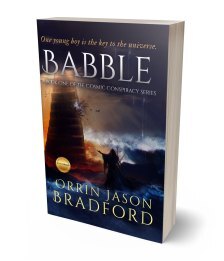 It’s happened again. One of my stories has insisted on growing beyond itself or to say it more accurately, it’s insisting on growing beyond my original expectation for it. I know this may sound odd to you, especially if you’ve never attempted to write a story, so let me try to explain, but hold onto your seat as I go a bit woo-woo on you.
It’s happened again. One of my stories has insisted on growing beyond itself or to say it more accurately, it’s insisting on growing beyond my original expectation for it. I know this may sound odd to you, especially if you’ve never attempted to write a story, so let me try to explain, but hold onto your seat as I go a bit woo-woo on you.
As an author, I believe I am a channel to a higher power, and that higher power is the source of my creativity so in essence, I’m co-creating the stories with this higher power which I refer to as my Muse. At least that’s the case in my finer moments. In truth, it is my Muse that is the source of all my best ideas. And from time to time the story I think the Muse is offering turns out to be larger than I had originally anticipated. Over the past thirty years of being a writer, this has happened a number of times.
From Short Story to Trilogy
Take Babble for example. Babble originally came to me as a simple science fiction short story, but without a satisfying ending. I tussled with it for weeks. I even sent the story to an author friend of mine for his input. He liked the story a lot but also didn’t know what the ending should be. As I remember it, I believe he was the one that suggested that the story might actually want to be an entire novel. Of course, I resisted that idea initially, but then my Muse intervened and started 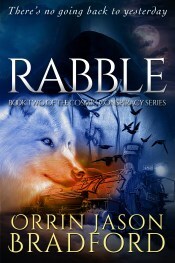 pointing the way. By the time the book was finished, it had become clear to me that its growth wasn’t over, thus Rabble unfolded next. (Book 3 is in outline form.)
pointing the way. By the time the book was finished, it had become clear to me that its growth wasn’t over, thus Rabble unfolded next. (Book 3 is in outline form.)
From Two Trilogies to One Mega-Series
A similar but different situation arose when I had the ‘brilliant idea’ (from the Muse no doubt) to combine two of my SF series into one long series. After all, they had similar themes and time periods, so why not? I put brilliant idea in quotation marks because of what I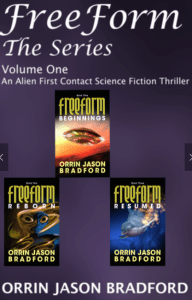 was to later discover. It was one of the most challenging endeavors I’ve ever taken on as a writer; challenging and ultimately fulfilling. Thus the FreeForm six-book series was born, and truthfully, it’s one of my most satisfying accomplishments as an author to date.
was to later discover. It was one of the most challenging endeavors I’ve ever taken on as a writer; challenging and ultimately fulfilling. Thus the FreeForm six-book series was born, and truthfully, it’s one of my most satisfying accomplishments as an author to date.
From Book 5 to a YA Spinoff Series
This time it is Rainforest Shaman, my current work-in-progress that’s acting out. It started out to be the fifth book of the Zak Bates Eco-Adventure series, but it wasn’t long after starting it that I began to wonder about it. For starters, it has some pretty mature themes taken from my own life as I’ve struggled with a diagnosis of cancer. It also has a much more involved plot with three different storylines that come together at the end. That’s when my Muse reminded me of a dream I’d had for years but had forgotten about. I always thought it would be neat to have a book series where the characters would grow in age and maturity as the readers grew as well, and I think Rainforest Shaman may be just that. In fact, the good ol’ Muse is encouraging me to allow Rainforest Shaman to become book 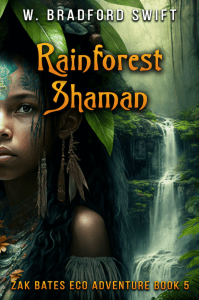 one of a spin-off trilogy (or new YA series) of the Zak Bates Eco-Adventure series.
one of a spin-off trilogy (or new YA series) of the Zak Bates Eco-Adventure series.
This is both thrilling and more than a little daunting. My connection with my Muse is thrilled by the idea while my identity has its share of doubt and trepidation, so what’s new? That’s part of the journey of being an indie author. I invite you to follow along. It should be a fun journey.
Please note: While I’d love for everyone reading this to jump over to my bookstore to pre-order Rainforest Shaman, it’s highly unlikely to be ready for publication in the first quarter of the year as I had originally planned. Still, isn’t it nice to have something in the future to look forward to enjoying?
The post When a Story Takes On a Life of Its Own appeared first on W. Bradford Swift Visionary Author.
January 9, 2023
A Writer’s Life — Grist for the Mill
For many people, the life of a writer seems like a dream come true. They imagine a life spent in coffee shops, writing the great American novel. While that may be part of a writer’s life, it is certainly not the whole story. A writer’s life is full of ups and downs, just like any other life. But, what makes a writer’s life unique is the way that they use their experiences, both good and bad, to fuel their writing.
In this article, we will take a look at the life of a writer and how they turn their life into grist for the mill. We will see how a writer’s life is full of both good and bad experiences, and how they use those experiences to fuel their writing.
Grist for the Mill: Childhood Experiences
A study published in the journal Frontiers in Psychology found that our earliest experiences shape the neural circuitry of our brains and influence our adult personalities. The study’s authors used a variety of methods to analyze how different types of experiences affected the brain development of rats and found that “early life experiences have a profound impact on the structure and function of brain circuits.”
This research suggests that our childhood experiences play a significant role in shaping who we are as adults. It’s important to note that this doesn’t mean that our experiences determine our fate; rather, they provide grist for the mill, so to speak. Our experiences help to shape and mold us, but we always have the power to choose how we respond to them.
If you’re struggling to make sense of your adult life, it may be helpful to reflect on your childhood experiences. What were the major events and relationships that shaped you? What lessons did you learn? How have those lessons influenced the choices you’ve made as an adult?
Taking the time to reflect on your past can be a helpful way to gain insight into your present. If you find yourself struggling, consider reaching out to a therapist or counselor who can help you explore your experiences and learn how to use them to your advantage.
Grist for the Mill: Ups and Downs
No matter what kind of person you are, you have probably faced some kind of adversity in your life. Whether it was something as small as a bad grade on a test or something as big as a divorce, everyone has faced some kind of challenge.
For writers, these challenges can be a source of inspiration. Many writers use their life’s ups and downs to fuel their creativity and produce great works of art. Some writers believe that it is necessary to experience pain and suffering in order to create great art. They feel that they need to have something to write about that is worth reading.
Others believe that they can use their imaginations to create fictional stories that are just as powerful as stories based on real-life events. No matter what your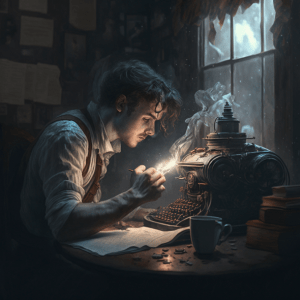 beliefs are, there is no doubt that adversity can be a great source of inspiration for writers. If you are facing some challenges in your life, don’t be discouraged. Use them to your advantage and let them inspire you to create something great.
beliefs are, there is no doubt that adversity can be a great source of inspiration for writers. If you are facing some challenges in your life, don’t be discouraged. Use them to your advantage and let them inspire you to create something great.
For example, I’m drawing heavily from my personal experiences in my WIP, Rainforest Shaman. One character’s biggest challenge is being diagnosed with cancer and deciding which treatment route to go. This happened to me in 2021 when I was diagnosed with cancer. My character just happens to choose the path I took including traveling to the rainforest as part of his healing journey. As it turned out, my own healing journey to the Ecuadorian rainforest was one of the high points not only for the year but for my entire life.
Grist for the Mill: Family and friends
When you’re a writer, your life can feel like one big grist mill, with family and friends as the fodder. It can be tough to keep your private life private when your job is to make up stories. But it’s also tough to find material for your work when you’re not mining your own life. So what’s a writer to do?
For some, the answer is to keep their personal and professional lives separate. They might have a strict policy about not writing about people they know. Or they might only write about their own life experiences in a very detached way.
Others find that their family and friends are a goldmine of material. They might not use real names or identifying details, but they’re constantly drawing on their personal relationships for inspiration.
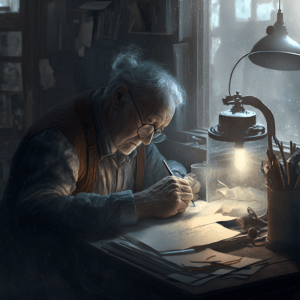 There’s no right or wrong way to approach this. It’s a personal decision that every writer has to make for themselves. But it’s worth considering how your relationships might be affected by your work. If you’re constantly mining your life for material, it can be tough to maintain boundaries. And if you’re not careful, you might end up hurting the people you love.
There’s no right or wrong way to approach this. It’s a personal decision that every writer has to make for themselves. But it’s worth considering how your relationships might be affected by your work. If you’re constantly mining your life for material, it can be tough to maintain boundaries. And if you’re not careful, you might end up hurting the people you love.
Grist for the Mill: Love and heartbreak
No one wants to hear about your writer’s block or how you can’t seem to get published. But everyone loves a good story about love and heartbreak. So what do you do? You use your own life as grist for the mill, of course!
Whether you’re writing a novel, a screenplay, or just a blog post, your personal experiences can be a goldmine of material. After all, who knows you better than yourself? And who can provide more emotionally resonant material than the people you’ve loved and lost?
Sure, it can be painful to dredge up old memories, but it’s also cathartic. And isn’t that what good writing is all about?
So next time you’re feeling creatively blocked, think about your past relationships. What went right? What went wrong? What lessons did you learn? Chances are, you’ll find plenty of material to work with—and you just might end up with a masterpiece.
Now Go Live an Interesting Life
In order to be a good writer, it’s helpful to live an interesting life. This is because interesting experiences make for good material to write about. Furthermore, a good writer must also be a good observer, and be able to take in and process the world around them in order to produce good writing.
Author’s Note: If you’d like to see firsthand how I incorporated key aspects of my own life into one of my stories, I recommend you start with RainForest Shaman, my current Work In Progress which is 50% off the retail price when you pre-order your copy. Go ahead. Treat yourself. You know you want to.
The post A Writer’s Life — Grist for the Mill appeared first on W. Bradford Swift Visionary Author.
December 15, 2022
Embracing A.I. as an Author of Fantasy and Science Fiction
Nathan Whitehall is an oil rig boss who is in his early fifties. He is balding with a fringe of greying hair and has piercing blue eyes. He is a large man with a barrel chest and thick arms. He wears stained overalls and a hard hat. He is a gruff man with a no-nonsense attitude. He is a tough boss but a fair one. He expects his workers to work hard and follow his orders. But he also knows how to have a good time. He is often seen in the local bars, telling stories and buying rounds of drinks for his friends.And I expanded it to:
Nathan Whitehall is an oil rig boss who is in his early fifties. He is balding with a fringe of greying hair and has piercing gray eyes. He is a large man with a barrel chest and thick hairy arms. He wears stained overalls with a C.E. logo on the chest and a hard hat. He is a gruff man with a no-nonsense attitude. He is a tough boss who is more interested in reaching quota than he is in staying inside the regulations or even the law. He expects his workers to work hard and follow his orders no matter what they are, but he also knows how to have a good time. He is often seen in the local bars, telling stories and buying rounds of drinks for his friends. Of course, everyone is a friend when you’re willing to buy them drinks.It’s early in the experiment, and I’m pleased so far. Are any other writers or other creatives out there trying it out? What do you think?Here is the image I selected from the four preliminary ones MidJourney gave back from the first couple of lines of QuickWrite’s description.Clearly, I’ve now added two A.I.s to my creative team.
You may also enjoy reading the opening scenes of my current WIP (work-in-progress), Rainforest Shaman, book 5 of the Zak Bates Eco-adventure series.
NOTE: The four images that led off this blog post are selfies from MidJourney I received when I entered the prompt: “What MidJourny AI thinks it looks like.” Pretty darn cool!The post Embracing A.I. as an Author of Fantasy and Science Fiction appeared first on W. Bradford Swift Visionary Author.
December 10, 2022
The Benefits of Reading Fantasy for Young Readers
Fantasy is one of the most widely-read genres of literature, and for good reason. Fantasy offers readers the chance to escape into new and exciting worlds, where anything is possible. For young readers, this can be especially beneficial. Fantasy can help young readers develop their imaginations, increase their empathy, and teach them important life lessons.
Fantasy is a genre of speculative fiction that typically deals with imaginative and supernatural concepts such as dragons, wizards, magic, and much more. It has been a part of literature since the days of Homer and has been adapted into countless movies, TV shows, and video games.
One of the main reasons why fantasy is so popular is because it allows readers to escape from the mundane reality of their lives and experience something truly exciting and different. It is a genre that is perfect for young readers as it can help them develop their imaginations and grow their love for reading. It’s also why I particularly enjoy writing fantasy that will appeal to young readers and their families.
Here are some of the benefits of reading fantasy for young readers:
1. It develops their imagination
Fantasy is all about imagination. When young readers immerse themselves in a fantasy world, they are letting their imaginations run wild. This is an important skill for young children to develop as it can help them in other areas of their lives such as problem-solving and creativity.
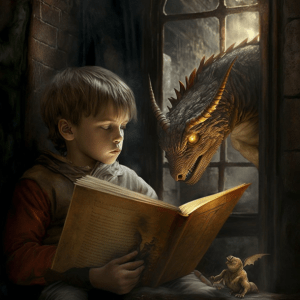 2. It helps them understand the world around them
2. It helps them understand the world around them
Fantasy can be used as a tool to help young readers understand the world around them. By looking at the world through a different lens, they can gain a new perspective on things. This can be especially beneficial for young children who are just starting to learn about the world and their place in it.
3. It teaches them about different cultures
Many fantasy stories are set in different cultures, which can teach young readers about those cultures. This is a great way for them to learn about different customs and beliefs without having to leave their comfort zone.
4. It helps them cope with difficult situations
Fantasy can also be used as a way to help young readers cope with difficult situations. By seeing how characters in a fantasy story deal with tough situations, they can learn how to deal with their own problems. This can be a valuable tool for young children who are dealing with things like divorce, bullying, or the death
Fantasy can take young readers to new and exciting worlds where they can explore different cultures and ideas. It can also help them to understand and process their own emotions and experiences. Reading fantasy can be a fun and rewarding experience for young readers.
If you enjoy fantasy books, you’ll love my fantasy books written for young readers. These books are packed with adventure, magic, and excitement, and are sure to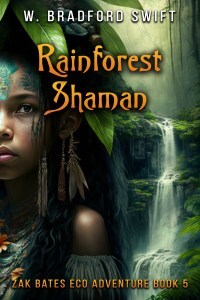 keep you entertained for hours. Check them out in my Porpoise Publishing Bookstore.
keep you entertained for hours. Check them out in my Porpoise Publishing Bookstore.
You may also enjoy reading the opening scenes of my current WIP (work-in-progress), Rainforest Shaman, book 5 of the Zak Bates Eco-adventure series.
The post The Benefits of Reading Fantasy for Young Readers appeared first on W. Bradford Swift Visionary Author.
September 21, 2022
Love Songs for the Earth (An Idea Whose Time has Come?)
First, I need to provide a little context and background on why I’m sharing this on my blog, lest you think I’ve gone over the deep end, ie crazy.
I’ve been deeply engaged for the past few months in an extraordinary online program, the Game Changers Intensive. It was created by the Pachamama Alliance which is the same organization that sponsored my recent trip to the Ecuadorian rainforest. The GCI is all about bringing forth the vision of the Pachamama Alliance.
A world that works for everyone, an environmentally sustainable, spiritually fulfilling, socially just human presence on this planet—a New Dream for humanity.
So, not infrequently during my morning meditation time. this vision comes to my awareness along with the question of what role might I play in bringing it forth.
A few days ago this idea poured forth over a few hours piece by piece. Since then I’ve reorganized the different components but other than that, what follows is pretty much as it came to me.
Let’s call it Love Songs for Earth (or substitute Gaia, or Pachamama in place of Earth if you prefer.)
Imagine singers and musicians from around the world coming together as they have before, this time to bring awareness to the climate crisis. How? To start, on Earth Day 2023, an announcement is made of a year-long contest that results in hundreds or even thousands of new love songs for Earth. This first phase would raise a global awareness not only of the climate crisis but more importantly of our deep love for our home where everything and everyone that matters live.
Then, on Earth Day 2024, the winners are announced in a gala online music festival reminiscent of previous Live Aid type concerts which would further raise awareness as well as funding. The money could be directed to bringing forth an environmentally sustainable, spiritually fulfilling, socially just human presence on this planet. Perhaps this event or events could be broadcast to the world through a combination of TikTok, YouTube, and Facebook Live events.
Why Am I Posting This Here?Here’s why. I know next to nothing about music and even less about the music industry. I can hardly carry a tune although I do love music and realize its power to inspire people into action.
So, I think maybe the Grand Muse of the Universe made a mistake by choosing me as its channel for this idea. Or at least, my main role is to share the idea with as many people as I can until the right person or people appear that could pull this off. And I know, even as I write this that ideas such as these are…well, just ideas. It feels a little like someone approaching me as they have before and saying.
“Look, I have a great idea for a bestselling book. Why don’t we collaborate together? I’ll give you the idea, you write the book, and we’ll split the royalties 50:50.”
And this may be just such a case, but if you’re reading this and you realize you could be the person or one of the people who would love to take this idea and run with it, please have at it. Leave me a comment below. Or perhaps you know someone that would love to take on such a project. Let’s talk. Leave me a comment and I’ll get back with you. In the meantime, I hope by writing this post, the Grand Muse of the Universe will now let me sleep.
A Quick Update (A Day Later)Well, maybe this is an idea whose time has come or even to re-emerge. I learned from one of my Game Changer Intensive small group participants that there’s already a song out published around 2015 entitled Love Song to the Earth, and it’s amazing, written and performed by some incredible performers. The list includes Paul McCartney, Jon Bon Jovi, Sheryl Crow, Fergie, Colbie Caillat, Natasha Bedingfield, and several others. There is also a Love Song to the Earth website and nonprofit.
Also, I have one person on board for moving this project forward and a second person who wants to learn more about it. So, a good day, all in all.
Loading…
The post Love Songs for the Earth (An Idea Whose Time has Come?) appeared first on W. Bradford Swift Visionary Author.

